social bookmarking tools:
 |
|
| Available RSS Feeds |
|---|
 - Top Picks - Top Picks |
 - Today's Music - Today's Music |
 - Editor's Blog - Editor's Blog
|
 - Articles - Articles
|
Add Louisville Music News' RSS Feed to Your Yahoo!
|
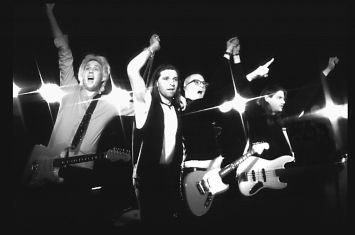
Cooler
By Bob Bahr
"No one cares, and I understand that. It just makes it hard."
Mark Ritcher, the lead singer and primary songwriter in the band Cooler, said the above statement or something similar a dozen times while he discussed the lurching start and stop of his band's career. He and his bandmates in Cooler were kings of the club circuit in the late '80s with the superlative cover band Hopscotch Army. The group called it quits in 1993. As Whale, then Whale U.S.A, then Superstar, and finally Cooler (they discovered the other names were taken), they honed their songwriting skills and produced a batch of more organic, rugged songs – and found that the Hopscotch fans couldn't care less. Undaunted, Cooler began inching into the local music scene's radar in the last two years and have recorded over 20 songs, twelve of which are appearing on their upcoming CD on Buzz Records, Pieces of Ache.
But their record label has delayed the album's release twice, and the four musicians are disheartened. It's now due out on April 1. In the eccentrically decorated Broadway apartment (Tweety Bird velvet painting, giant wooden scimitar, a room devoted to various drum sets) that guitarist Jeff Goebel shares with several other musicians, the dominant feeling the band exuded was one of weariness. Veterans of the local music scene, committed and genuinely excited about the material they have developed, Cooler sat in chairs about the room, frustrated about the delays, trying to sound upbeat and not as cynical as they clearly are.
"Not many people like us, but the people who do like us, love us," Goebel offered after some silence. Not exactly a ringing endorsement.
And not exactly true. A corps of 30 or 40 extremely loyal people do constitute the core of Cooler's following, but the group is growing. It's just that Goebel, Ritcher, bassist Scott Darrow and drummer Dave Hoback know firsthand what a big following in this town means: 1,500 people packing the Brewery to hear a cover band play the latest fad on pop radio.
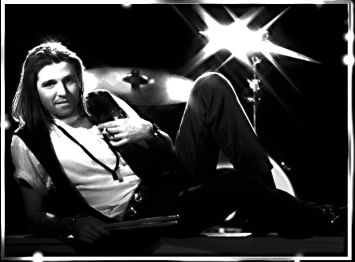
Cooler fights an uphill battle to get that kind of popularity. Older scenesters smell a rat, and see Cooler as a repackaging of Hopscotch Army, a group that was much maligned by the arbiters of hip. Underground fans dismiss them because they play at Butchertown Pub and other multi-stage venues. Uncool. And the band is much too dark and biting for the masses looking for feel-good music and soundtracks for drinking and chasing girls/boys. Cooler is a band that has fallen through the cracks up to this point. The band hopes that the release of Pieces of Ache will change things. Once the band catches a critical or hipster buzz, every club in town will want them. But until then, Cooler is plagued by incidents such as this one, recounted by Hoback. Here's the background: The group was trolling for bookings, but they weren't having much luck.
"Courtland [Rose, manager of the Phoenix Hill Tavern] came in to see us at Tewligan's and stayed for maybe half a song, maybe even 30 seconds, and just walked out," Hoback said. "It was during one of our moodiest, slowest songs – 'Do You Really Want Me to Get Over You,' I think. Thirty seconds, and I looked up and he was gone."
Hoback was wincing, more than anything else, about Mr. Rose's poor timing. If he had heard the riff-powered "Royal Blue," Cooler might be Courtland's favorite band right now.
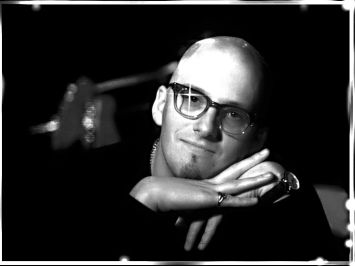
Hoback was also indirectly addressing Cooler's pivotal trait, the characteristic that fans find endearing, and the unprepared and unsuspecting misinterpret and, well, hate about the band. In short, Cooler has an obsession with heartbreak and despair.
It's not particularly subtle. The aforementioned tune, "Do You Really Want Me To Get Over You," has Ritcher singing, "Is this the hell I have to go through?/Just to prove my heart is true/Do you want me to get over you?" In "Unsurmountable," the most naked of Ritcher's lovelost songs, he chants, "Just let me die/Just let me die/Just let me die." And the jewel of Cooler's set used to be the effective "She Doesn't Feel Like You Used To," which details the futility of someone trying to see others while still strung out on a past love.
Opening with Ritcher strumming chords and acknowledging the good points of a new girl, the band kicks in as he says, "She doesn't feel like you used to/And that's what I'm used to/That's what I used to get me through." Clearly an emotional hotpoint for Cooler's frontman, the song was usually saved until the end of their set and often left Ritcher drained, alone on the stage with his guitar, feedback swirling and the emotion palpable. It's fun to look around a club at the conclusion of that song and see the faces of the crowd. Half the people seem to be muttering "get over it" under their breath; the other half are gleeful that Ritcher has found a way to express another dark nook of relationships.
Ritcher said that both he and Goebel write a lot about long-term relationships that have left deep scars on their psyches. Pieces of Ache is rife with them. Ritcher said the end to this theme is not in sight.
"There's a lot of them left over still. It'll be a while before we get through with that," Ritcher said. "I don't know if we'll always be writing about that, but it seems to be the case right now."
The trap that some fall into is failing to detect the self-deprecating humor running through almost every Cooler song. Cooler seems determined to make people see just how ridiculous this melodramatic clinging to a moribund love really is. On stage, this pointed sense of humor manifests itself in sarcastic rock heroics – see Goebel adopt a guitar god pose and hear Ritcher scream "Are you ready to rock, Louisville?" They realize that some of the feelings are disproportionate and goofy. It doesn't make them go away.
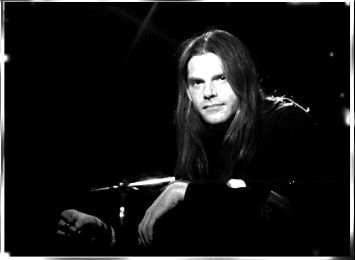
Within the songs, the characters range from a boy waiting for his girl to come home from school, saying, "In your dress/I'm glad you don't wear jeans/I must confess/It changes everything" in "Dress," to the reluctant loser who sighs "I know/She was the closest thing to heaven/But even so/That was in 1987" in "Stubborn." If you don't laugh a few times when you're listening to Cooler, then you're missing it.
Which isn't to say that Cooler's music lacks sincerity. Hoback uses honesty as a yardstick to measure songs, and says that Cooler dishes it out equally to the "pop" songs and the moodier songs. And for Ritcher, the wit that takes the edge off of the pain in no way negates the bald-faced sentiment of the material.
"That song ["She Doesn't Feel Like You Used To"] in particular, on that song we really hit something," Ritcher said. "That song just really isn't funny anymore, and it takes quite a while to get over it. I don't want to have to feel that way every time. It takes a lot out of you. I don't know how much people can tell that we play that song so sincerely. I don't think that I could feel much more intensely about anything than I do about these songs that we're playing right now."
That's a key point, because in the waning days of Hopscotch Army, Darrow, Goebel, Hoback and Ritcher weren't particularly excited about playing their songlist. Looking back, the four members wished they had made the break with their cover band persona a lot earlier. Cooler songs such as "Royal Blue" were in the repertoire even then, but Hopscotch fans weren't happy about it. Now, Hoback says that the one thing that he doesn't want Cooler to sound like is Hopscotch Army. Consider this: Other bands have toiled in relative obscurity pushing their original songs, but Cooler has tasted the easy money of the cover band life and consciously gave it up.
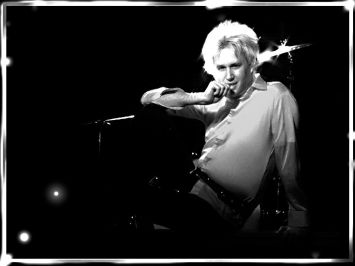
They hold only a faint nostalgia for their past band affiliations. A cumulative list for the four Coolers would include bands such as Love Jones, Starbilly, Nuvo, the Velcro Pygmies, Big Head and Speak English. Goebel, the most traditionally rock 'n' roll of the four, is currently in several other bands, including a new project called Tony Kimbro that is rising out of the ashes of Starbilly. The charismatic Ritcher filled in for Metroschifter's bassist on their recent tour of Europe, and local fixture Hoback can be seen here and there in various local groups. Darrow, one of the quietest and wryest men in Louisville, works hard in his family's business. Cooler is their collective passion though.
Twists, especially rhythmic twists, abound in Cooler's songs. The more accessible and poppy the tune, the more likely they'll build an odd time signature into the composition. It is a natural process, Ritcher said.
"It's not a conscious thing at all. The time changes are due to melodic necessity. We're not aware of time signature changes when we're writing them. It's so natural that we're not aware that it's happening until Dave has to figure it out."
Two good examples of this rhythmic complexity are "Fall" and "Cooler," the song that gave the band its name. "Fall" is also notable for its bitterness and vengeance, yet another facet of Ritcher's post-relationship blues that he hangs out to dry in Cooler's music. But lest you get the impression that Cooler is all darkness and melancholy, consider these lines from "I Don't Know How To Go Anywhere": "With you beside me/We'll ride like angels fly/I'll make you happy/If you will just be mine." Sunny, huh? But in context, it's really just the song's character imagining how good things could be if the two lovers could patch things up. Even the silver linings have grey clouds.
To the band's great consternation, most of the songs on Pieces of Ache are over two years old; the oldest is more than three years old and the youngest is at least a year old. The CD is pieced together from two tapes Cooler released to fans, one recorded over several months at Ritcher's parents' house, and the other knocked out in ten days at Melody Hill Farm studio. They have over 40 songs waiting for their turn in the studio.
"Right now, we probably have another hour's worth of music that hasn't even seen tape yet," Hoback said.
"It just gets frustrating when you have a bunch of songs backed up and the album that's going to come out has a bunch of old songs on it," Ritcher added. "And you know that you're going to be playing them live because they're on the album."
Pause.
"Having good songs doesn't mean anything," Ritcher continued.
"We have a ton of songs and we think they're pretty good. Maybe we think that if we have good songs then the other stuff will come, but maybe that's sort of a naive attitude."
Another pause.
"There's probably bands that could play our songs better than us, either through better musicianship or just believing in the whole entertaining thing," Goebel offered. But the most likely explanation for Cooler's struggles is that they simply have fallen between the cracks.
As Ritcher said, "If we were into the all-ages scene or the hippie scene, it would be really easy to fit in because all we have to do is open up for the right band once. But there really isn't a loud pop scene, so we just have to forge our own scene."
The vast majority of Cooler's tunes are written by Ritcher, but he gets equally excited about Goebel's tunes. "Jeff only writes like two songs a year, but I swear they are the best songs that you'll hear," Ritcher said. And he isn't kidding.
Goebel is represented on Pieces of AcheBy "Power Rock '73," a hilarious and insightful look at how easy and clumsily one can keep a good love alive. "Tell her that you will be true/And that her eyes do sparkle blue/And even if they're green she'll forgive you," Goebel sings, and truer words have never been sung. "Power Rock '73" is possibly the biggest, hookiest rock song you'll hear this year, poppier than a Matthew Sweet album and catchier than a Pavement CD.
Great melodies abound. In fact, hearing the clean crunchiness of a tune like "Tiny Bit of Dignity" makes one think that Cooler is ready for global domination. What if the right ears heard the heavy riffs of "Fall" or the ultimate sing-ability of "If Only"? What if America caught on to Cooler? Would these skeptical musicians get in the van?
Yes," said Hoback. "So fast it would make your head spin."
"We've all constructed our lives so that we could do that – we all have jobs that are horrible," Goebel said. In fact, the group is impatient to hit the road behind the album. This from a group that will and does drive 200 miles and spend $200 on a $75 gig – in a cheesy hotel bar outside of Cincinnati.
"We actually got together and talked about why things are going so slow," Ritcher said. "It's exactly what we want to do. I mean, come on. We wouldn't just be losing money on purpose. We do it because we love it."
